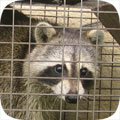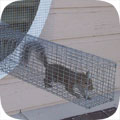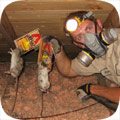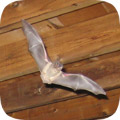- wilson@wildlifeanimalcontrol.com
Call 24/7 for a free quote:
984-569-6073
Wilson Wildlife Animal Control
Professional Wildlife Removal Company Servicing Wilson, NC
If you have a problem with wildlife in your Wilson home, your best option is to hire a company that specializes in North Carolina wildlife removal only. This is a specialty business, and regular pest control companies do not use the proper techniques to solve animal problems. I have spent many years reviewing North Carolina and Wilson, and I recommend the following:
Carolina Wildlife Removal
Cell Phone: 984-569-6073
NOTE: If you have a dog or cat problem, call Wilson County Animal Services: 252-265-5971

Carolina Wildlife Removal specializes primarily in removing animals from attics of homes and buildings - this includes squirrels in attics, raccoons, and rats or mice in homes. North Carolina also has a documented problem with
bats in buildings, and Carolina Wildlife Removal is specially trained in bat removal. They also perform general wildlife trapping services, such as the capture and removal of skunks or opossums on the
property. Call 984-569-6073 to discuss your critter problem and schedule a same-day or next-day appointment. Click here to learn more about
what prices we charge in 2025.
When hiring a company to solve your wild animal problem, you want these features:
- Specializes in wildlife removal, not pest control
- Fully North Carolina and Wilson County licensed and insured
- Works 7 days per week (critters don't take weekends off)
- Performs full building inspections: enters and inspects attic
- Performs exclusion repairs, with guarantee against animal re-entry
- Offers cleanup of biohazardous wildlife waste
Carolina Wildlife Removal is a full-service Wilson wildlife removal company. This is very different from a regular Wilson pest control company. The pest control companies spray poison to kill insects. This is not at all
similar to wildlife removal. Carolina Wildlife Removal performs a full inspection of the home or property, and determines why the animal(s) are there, and if inside a building, how the animals got inside. All
animals (including rodents) are trapped and removed, or if possible, removed from the building using special exclusion devices. Once the animals are gone, preventative repairs are essential, and
cleanup is sometimes recommended.
 Wilson wildlife trapping - it's not as simple as it may seem. It's illegal in North Carolina to trap without a license. Trap type is very important and there are many different types, bait is somewhat relevant, trap placement
is vital, and there are dozens of small things that are very important to know.
Safety is a concern. Then once the animal is trapped, it must be removed and dealt with in the proper manner according to North Carolina law. We offer Wilson raccoon removal. Read more about how to get rid of raccoons.
Wilson wildlife trapping - it's not as simple as it may seem. It's illegal in North Carolina to trap without a license. Trap type is very important and there are many different types, bait is somewhat relevant, trap placement
is vital, and there are dozens of small things that are very important to know.
Safety is a concern. Then once the animal is trapped, it must be removed and dealt with in the proper manner according to North Carolina law. We offer Wilson raccoon removal. Read more about how to get rid of raccoons.
 Animals in attics - this is our specialty at Carolina Wildlife Removal. Many types of animals like to live in attics. This includes squirrels, raccoons, rats, mice, bats, birds, and even possums. Critters like to go into attics for a safe place to live
and raise their young. Removing animals from attics is very complex work, partly because of the presence of baby animals. If you need Wilson squirrel removal, we can remove all the squirrels from your attic, and seal out any future ones. Read more about how to get rid of squirrels.
Animals in attics - this is our specialty at Carolina Wildlife Removal. Many types of animals like to live in attics. This includes squirrels, raccoons, rats, mice, bats, birds, and even possums. Critters like to go into attics for a safe place to live
and raise their young. Removing animals from attics is very complex work, partly because of the presence of baby animals. If you need Wilson squirrel removal, we can remove all the squirrels from your attic, and seal out any future ones. Read more about how to get rid of squirrels.
 Rodent control must be done in a very specific way. First off, the most important thing is that all the openings that rats and mice can use to enter a house be sealed. Then all the rodents must be physically trapped and removed.
Never, ever use poison! Most Wilson exterminators will just use this lazy poison technique to kill rodents, and it causes more harm than good - dead stinky rats, and it doesn't solve the problem. Call us for correct Wilson rat removal. Read more about how to get rid of rats.
Rodent control must be done in a very specific way. First off, the most important thing is that all the openings that rats and mice can use to enter a house be sealed. Then all the rodents must be physically trapped and removed.
Never, ever use poison! Most Wilson exterminators will just use this lazy poison technique to kill rodents, and it causes more harm than good - dead stinky rats, and it doesn't solve the problem. Call us for correct Wilson rat removal. Read more about how to get rid of rats.
 Bat removal is a highly specialized task. North Carolina is known to have colonizing bats who often live in buildings. Bats love attics. If not removed, the colony can grow to a very large size over the years. The bat droppings are often corrosive and
cause health risks. The same goes for bird droppings on or in buildings. We perform Wilson pigeon removal and bird control. But our specialty is Wilson bat removal. We remove 100% of the bat colony and seal the building so that it's totally bat-proof. Read more about how to get rid of bats.
Bat removal is a highly specialized task. North Carolina is known to have colonizing bats who often live in buildings. Bats love attics. If not removed, the colony can grow to a very large size over the years. The bat droppings are often corrosive and
cause health risks. The same goes for bird droppings on or in buildings. We perform Wilson pigeon removal and bird control. But our specialty is Wilson bat removal. We remove 100% of the bat colony and seal the building so that it's totally bat-proof. Read more about how to get rid of bats.
 If you have animals inside a house, no job is complete without proper exclusion repairs. If you simply hire a Wilson trapper who only removes the critters, then the problem will return. You need to hire a Wilson wildlife control company that identifies 100% of the animal entry points
into your building, and seals them shut with professional repairs. In addition, in many cases animals have left waste or contamination behind, and you'll want a company that can provide professional cleaning services. Carolina Wildlife Removal does both.
If you have animals inside a house, no job is complete without proper exclusion repairs. If you simply hire a Wilson trapper who only removes the critters, then the problem will return. You need to hire a Wilson wildlife control company that identifies 100% of the animal entry points
into your building, and seals them shut with professional repairs. In addition, in many cases animals have left waste or contamination behind, and you'll want a company that can provide professional cleaning services. Carolina Wildlife Removal does both.
The above are just some of the services offered by Carolina Wildlife Removal. We also trap and remove animals that destroy lawns, such as moles, or digging animals. Sometimes animals like opossums will live under buildings, steal pet food, raid garbage cans, etc.
Read about how to get rid of opossums. Skunks commonly live under sheds or decks, and set up a den. We can trap and remove them without them spraying. Read about how to get rid of skunks. Carolina Wildlife Removal
also provides dead animal removal in Wilson. If you need help with any other wildlife conflict, from a fox, beaver, groundhog, or any other critter, we can solve it. We also do Wilson snake removal - most of the snakes in North Carolina are not venomous, but
call us if you want safe removal, or read about how to get rid of snakes in Wilson. And remember, we are a private business, not Wilson County Animal Control Services, so if you have a dog or cat problem, call the County at 252-265-5971.
Wilson County animal services does not handle any wildlife issues.
Carolina Wildlife Removal
Cell Phone: 984-569-6073
Wilson Pricing Info
Every wildlife removal situation is different, from the species of animals involved, the location of the animal inside a house or outside, the extent of repairs or cleanup, etc. It's impossible to give one-size-fits-all prices. Examples MIGHT include:Small Job: For example, a one-stop job to remove an animal in the yard: $100 on up
Medium Job: For example, getting critters out of your house with minor repairs: $300 on up
Large Job: For example, a project involving many service trips and complex work: $500 on up
Give us a phone call now and tell us about your wildlife issue and we will be able to give you a price estimate over the phone. If you're cool with it, we can schedule a same-day or next-day appointment if you like. Our prices are fair, and a good value because we do the job right, the first time.
Wilson Wildlife Tip #1:
About squirrels
AppearanceIt's fairly easy to spot a squirrel from other rodents like mice and the like. How? Well, their tail is a dead giveaway. Wide, long, and bushy, and covering the back of a squirrel when it sits on its hind legs, a squirrel's tail is certainly its most iconic feature.
Apart from the tail, however, there isn't anything noteworthy about a squirrel's appearance. Small body, silky fur, beady eyes, and a snout shaped nose, nothing too eye-catching. Even the color of their fur ranging from black to brown to light orange doesn't draw attention (which is kind of the point actually).
Biology
Squirrels reach sexual maturity at about nine months of age and start looking for mates twice a year around the months of spring and then later in autumn. Like many other animals, squirrels do not mate for life with males competing for females that hive off a "welcoming" scent. While the dominant male gets to go first, other males do "get their turn" if they're patient. Once they've mated, the males wander off, leaving the females to take care of the young on her own. Typical.
Lifecycle
After a gestation period of a few weeks, the mother gives birth to around four babies on average, all of which are born blind, deaf and (gasp!) hairless. They rely completely on their mother for food and protection who can wean them in six to ten weeks. After that, they're able to leave the nest but stick around their mothers for a couple more weeks to learn how to hunt for food and survive. After that, they're ready to go off on their own.
Habitat
Squirrels are indigenous to every continent in the world, except Antarctica and Australia, the former due to its inhabitable climate and the latter due to competition from possums. Where a squirrel makes its home depends on its species; tree squirrels make their home in a hole in a tree, while ground squirrels make networks of burrows to live in.
Diet
Squirrels primarily search for foods high in carbohydrates, fats, and proteins, due to their incapability of digesting cellulose (fiber). That's why their diet consists mainly of diet a wide range of plants, including green vegetation, fungi, fruits, seeds, nuts, and conifer cones. Though if push comes to shove, squirrels can be driven by hunger to consume insects and meat and have even been known to go after small birds and their eggs.
Behavior
Squirrels are EXTREMELY territorial. Ever heard one barking at you when you came close to it? Yup, you're probably trespassing on its marked territory. And they don't just mark one place. Squirrels often occupy two or more trees at a time, using the holes in them to store food when its available in abundance.
Wilson Wildlife Tip #2:
North Carolina Wildlife Information:
North Carolina State bird: Northern cardinal
State mammal: Gray squirrel
State reptile: Eastern box turtle
State fish: Channel bass
State insect: European honeybee
Few states have as nice of a geological flow as North Carolina. This state is divided almost into equal sections, making up three distinct habitat zones. The first zone, known as the coastal plain, starts with the sandy beaches by the Atlantic Ocean and heads inland through flat fields of tall grass. Eventually the land begins to rise upward, giving way to the central section of gentle foothills and thicker forests. The Appalachian Mountains make up the final, most inland section of the state. Here, the weather can be slightly cooler, though North Carolina is considered to have a consistently warm climate.
At the coast, beach-goers and business owners have to do daily battle with the scores of bold seagulls. These birds are fearless when it comes to people and pets, and they are so brazen they will often take food right away from people on the sand. Not only are the seagulls thieves, they eventually expel their waste all over the beach, sidewalks, and sea-side businesses. Other creature issues in the sand are related to jellyfish, which wash up on shore daily. These aquatic animals can sting even in death, and many an unwary, barefoot soul has stepped on the gelatinous pile and gotten stung.
North Carolina has a range of coastal islands called the Outer Banks. These islands are home to the Banker horse, a small, stocky animal with bloodlines originating form Spanish horses brought over with the explorers. These horses are protected because of their historical import, and they are allowed to roam free on the islands, walking across roadways and grazing in people's front yards. The wildlife agencies that oversee the horse population make sure they are free of infectious disease.
Large predators in the state stay mainly in the foothills and the mountains. These include coyotes and black bear. While shy, black bear have been known to destroy birdfeeders due to their love of birdseed. They will also take advantage of an unprotected garbage bin. Unlike coyotes, black bear will move on once the food supply has vanished. Coyotes, if in an urban setting, can be a threat to children and pets.
North Carolina also has a familiar list of nuisance animals such as the raccoon, opossum, skunk, woodchuck, porcupine, beaver, squirrel, rat, bat, and snake.
You can always call Carolina Wildlife Removal, any time of day, at 984-569-6073, for a price quote for Wilson wildlife control services. I am confident that this is the best choice amongst wildlife removal companies in Wilson, NC.







































